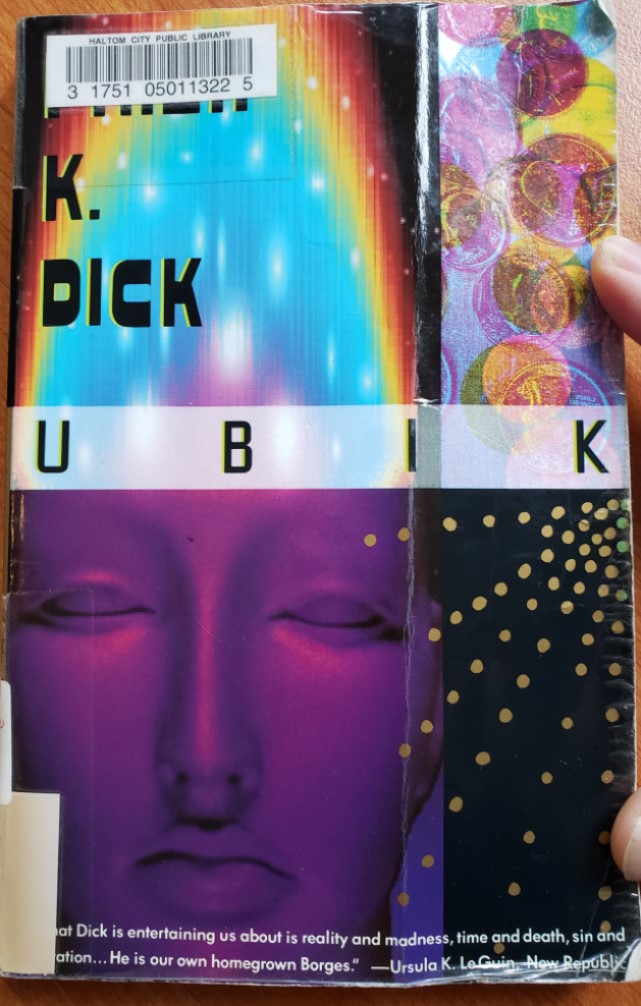With a long Thanksgiving weekend approaching I decided to pick up a short novel by Philip K. Dick (PKD). The Fort Worth Public Library has one of Dick’s most well-regarded novels, 1969’s Ubik. I took advantage of the library’s curbside pickup, offered during the Coronavirus pandemic, which we are still in the midst of as I’m typing.
I became aware of Dick while a teenager, impressed with the film Blade Runner, which was based on one of his novels. Shortly after, while a freshman at Penn State, I stumbled upon an anthology of sci-fi stories while wandering around the main library. Called “Philosophy and Science Fiction”, it included Dick’s story “Imposter”, which I highly recommend. In fact I remember sitting in a library carrel, riveted. I then tried to find more by Philip K. Dick in the library, but the only one of his novels they had that was available at the time was “Solar Lottery” from 1955, which I believe is his first novel. I think I read it over Xmas break, and I was severely disappointed. The only thing I remember about the story is that it was silly, half-baked, and very dated. Although I grew up in the Star Wars generation and consumed a lot of sci-fi, I’m a little too young to have grown up in the era of pulp sci-fi novels. Solar Lottery fit my idea of pulp, meaning low quality stories that are cranked out quickly to people – mostly kids – with non-descriminating tastes. Dick was one of these type of authors. But some of his novels and stories are well-regarded, especially the ones written after he started taking LSD and loads of amphetamines. A Google search reveals that Ubik is among Dick’s novels with the best reputation. In fact, Ubik was selected one of the 100 best novels since 1923, by Time Magazine. Lucky for me, they happen to have a paperback copy of Ubik at the Fort Worth public library.

Ubik is a short novel and a page turner. But I was discouraged at the beginning because of all the lingo that you have to figure out before you can understand what’s happening: precogs, inertials, half-life, psis, etc. After several pages, however, this ceases to be a problem and the story flies along. Like other PKD stories, Ubik deals with the nature of reality itself. As we move along, our protagonist, Joe Chip, starts to consider whether or not he has been killed in an explosion but is being kept in a state of existence called “half-life”. Towards the end it becomes apparent that this one of those stories where readers are left to their own interpretations as to what actually happened and what it’s all about. Those who hate that sort of thing will want to avoid Ubik. I like it when it’s done well but if I think the author is just making things up on the fly and couldn’t be bothered to figure out a coherent ending I lose all respect for him or her. It’s apparent that PKD, however, is reporting on some darker features and truths of the human condition.
What Ubik Is
Each of the 17 chapters is preceded by a short paragraph about Ubik. Each one is comical, sarcastic ad copy featuring a product called Ubik, except the last chapter, which implies that Ubik is actually some sort of all-powerful force that some critics interpret as God. Ubik doesn’t enter the narrative until half-way through the novel, so at first there doesn’t seem to be any connection between these introductory paragraphs and the story.
My interpretation is that Ubik represents a part of the human psyche that drives us to be obsessed with acquiring material possessions. These products are, in a sense, our Gods. Several scenes in the book deal with characters’ problems with money, and there’s almost a constant struggle to obtain simple products, like cigarettes or coffee. But once acquired, those products are never good enough, and even seem artificial. The product “Ubik” takes different forms and seems to offer the user some form of salvation, but this protection is temporary and the user must continuously acquire more Ubik to stay alive.
Note to Filmmakers
Like a lot of science fiction classics, including 2001: A Space Odyssey, Ubik is set in the not-too-distant future – 1992 – and includes technology and events that did not come close to arriving on time as described in the book. Usually this causes a past novel to seem quaint, dated, or corny. In Ubik’s case, PKD’s 1969 prediction of 1992 is interesting, especially due to the book’s theme of questioning reality. Dick’s work has been adapted to the screen many times with varying degrees of success. When adapting adapting a sci-fi classic filmmakers often and understandably try to update it for the current times. While reading Ubik, however, I kept thinking it would be a joy to see someone (Terry Gilliam ?) create Ubik for the big screen by keeping as close to PKD’s vision as possible, including still having it set in 1992. In Dick’s vision of 1992, everything, including your front door, is coin-operated, and I think these and many more idiosyncratic and bizarre details would make a memorable film.
Leave a Reply